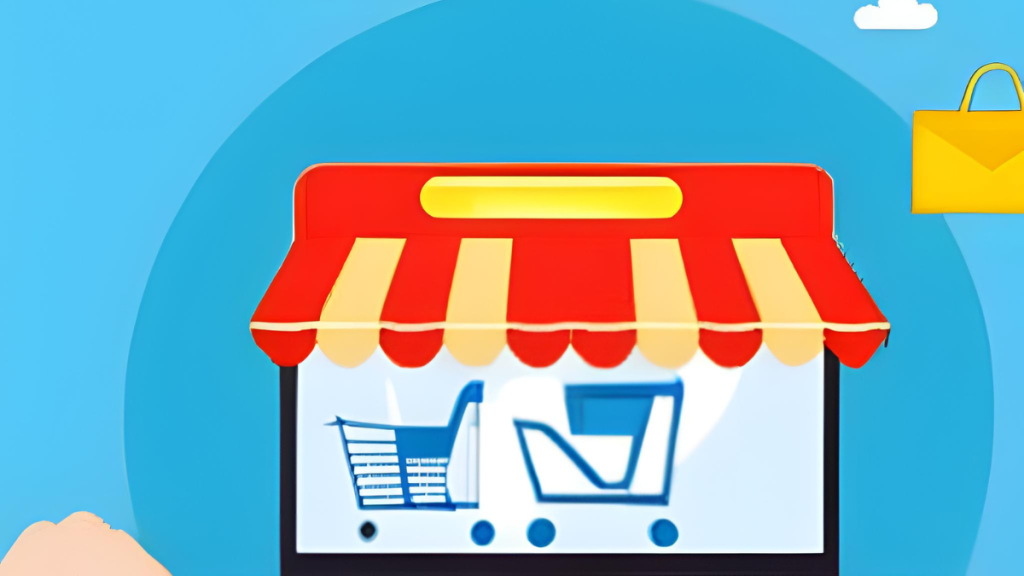E-COMMERCE EN MARKETPLACES
Acelera tu empresa con estos consejos de expertos que cuenta sobre «e-Commerce en Marketplaces». ¡Analiza y descubre esta TIP!
Veamos los marketplaces como lo que son: una alternativa de bajo riesgo y alto potencial para vender y, sobre todo, confirmar que nuestra propuesta de valor (+) tiene mercado. ¡Con prudencia y estrategia te recomiendo que lo evalúes!
En una primera fase, las empresas han renegado del e-commerce, han dicho tres veces (y muchas más…) que esto de vender online no era su estilo, que a lo mejor para viajes si tenía sentido que para su sector no, (ropa, zapatos,… todos han ido desmontando el mito) hasta que se han dado cuenta de que sí lo tenía, y mucho más en la situación actual de confinamiento.
Entonces, y durante algunos años, las empresas han apostado por invertir mucho dinero, recursos y talento en desarrollar soluciones e-commerce propias, aprovechando su marca comercial establecida o empezando de cero una nueva. Todo lo que olía a digital y a venta parecía que tendría sentido y que permitiría a la empresa alcanzar sus objetivos. La realidad es muy distinta, ¡¡hacer e-commerce rentable es muy difícil!! Hacer e-commerce sin ganar dinero es mucho más fácil… ¡y habitual!
Por eso, de nuevo, resurge con fuerza la apuesta más segura en e-commerce, apostar primero por, testar que nuestra marca, producto y precio tienen sentido para algunos clientes, y nada mejor que hacerlo en un mercado donde hay millones de consumidores y con carácter global.
De nuevo Amazon, eBay, AliExpress y muchos más, empiezan a tener mucho sentido para las empresas que quieren vender, pero no asumir las grandes inversiones que supone montar tu propia plataforma.
Como resumen, las alternativas que tendríamos son
- Montar tu propia plataforma e-commerce, atraer tráfico, organizar la logística y logística inversa, conectar los sistemas de CRM y stocks de tu negocio con la tienda online, evitar el fraude, asegurar la información, etc.… y, por último, hacer que todo esto suponga un valor inferior al margen comercial obtenido por las ventas. ¡Muy pocas empresas podrán lograr que el balance sea positivo a corto plazo!
- Montar una tienda en un Marketplace y testar que nuestra propuesta de valor obtiene ventas. Pagamos un % y en función del Marketplace y del nivel de servicio que contratemos asumimos muy pocas funciones o muchas. En cualquier caso, ¡¡no asumimos inversión de desarrollo de plataforma ni riesgo de fraude y tenemos asegurado no perder!!
Mi sugerencia es empezar por la primera alternativa en uno o varios Marketplace y, una vez, confirmada su validez y que obtendríamos margen suficiente continuar con la segunda. ¡Siempre manteniendo las dos en paralelo! Se complementan y nutren entre ellas.
Visita ebay, Amazon y AliExpress y busca los productos que quieres vender.
También puedes ampliar la información:
VISITANDO ESTA PÁGINA (+).
VIENDO ESTE VÍDEO (+).
PROGRAMA DE PODCAST (+).
El comercio electrónico en marketplaces se refiere a la venta de productos o servicios a través de plataformas de comercio electrónico como Amazon, eBay, Alibaba, MercadoLibre, entre otros. Los marketplaces permiten a los vendedores publicar sus productos en la plataforma y llegar a una audiencia masiva de compradores en línea.
A continuación, se presentan algunos puntos importantes a considerar al vender en marketplaces:
- Se debe investigar el marketplace adecuado para el tipo de producto o servicio que se ofrece, así como las políticas de venta y comisiones que se cobran.
- Es importante tener una descripción detallada y precisa del producto, así como imágenes de alta calidad para atraer a los compradores y aumentar la tasa de conversión.
- Los vendedores deben considerar la competencia en la plataforma y ofrecer precios competitivos para destacar frente a otros vendedores.
- Es necesario manejar adecuadamente la logística y el envío para asegurar que el producto llegue en buen estado y dentro del plazo de entrega estimado.
- Los vendedores deben manejar adecuadamente la atención al cliente y responder a preguntas y quejas de manera oportuna y efectiva para garantizar una buena reputación en la plataforma.
Algunos casos de éxito de empresas que han vendido en marketplaces incluyen:
- Anker, una empresa que vende accesorios electrónicos, logró ventas de más de $30 millones de dólares en Amazon en su primer año de operaciones.
- Thule, una empresa que vende productos para actividades al aire libre, aumentó sus ventas en un 70% después de comenzar a vender en Amazon.
- Apple, una empresa reconocida mundialmente, ha aumentado sus ventas y ha llegado a una audiencia más amplia al vender en Alibaba, uno de los marketplaces más grandes en Asia.
En resumen, vender en marketplaces puede ser una estrategia efectiva para llegar a una audiencia más amplia y aumentar las ventas en línea. Sin embargo, es importante investigar y considerar cuidadosamente las políticas y comisiones de cada plataforma, manejar adecuadamente la logística y la atención al cliente, y ofrecer precios y descripciones competitivas para destacar frente a otros vendedores en la plataforma.
¿Cómo empezar a vender E-COMMERCE EN MARKETPLACES?
PARA EMPEZAR A VENDER EN MARKETPLACES DE COMERCIO ELECTRÓNICO, SE RECOMIENDA SEGUIR LOS SIGUIENTES PASOS:
- Investiga y elige el marketplace adecuado: existen muchos marketplaces en el mercado, por lo que es importante investigar y elegir el que mejor se adapte a tu negocio. Algunos de los más populares son Amazon, eBay, Alibaba, Walmart, entre otros.
- Regístrate y crea una cuenta de vendedor: una vez que hayas elegido el marketplace adecuado, deberás registrarte y crear una cuenta de vendedor. Asegúrate de completar toda la información necesaria, como tu información de contacto, detalles de la empresa y los productos que ofreces.
- Configura tu tienda: cada marketplace tiene su propio conjunto de reglas y requisitos para los vendedores. Es importante que leas detenidamente las políticas y requisitos de cada uno y configures tu tienda de acuerdo a ellas. Asegúrate de incluir fotografías y descripciones detalladas de tus productos para atraer a los clientes.
- Comienza a publicar tus productos: una vez que hayas configurado tu tienda, es hora de publicar tus productos en el marketplace. Asegúrate de seguir las pautas del marketplace para la publicación de productos y etiquetarlos correctamente.
- Gestiona tus ventas y envíos: cuando comiences a recibir pedidos, deberás gestionarlos y enviarlos a tiempo. Algunos marketplaces ofrecen herramientas para ayudarte con la gestión de pedidos y envíos, por lo que es importante que te familiarices con ellas.
- Promociona tus productos: para destacar en un marketplace, es importante promocionar tus productos. Algunos marketplaces ofrecen herramientas de publicidad pagada para destacar tus productos, pero también puedes utilizar las redes sociales y otras estrategias de marketing digital para atraer a los clientes.
En resumen, para empezar a vender en marketplaces de comercio electrónico, deberás investigar y elegir el marketplace adecuado, registrar tu cuenta de vendedor, configurar tu tienda, publicar tus productos, gestionar tus ventas y envíos, y promocionar tus productos.
Ventajas e inconvenientes de E-COMMERCE EN MARKETPLACES para los emprendedores
ALGUNAS VENTAJAS DE UTILIZAR EL E-COMMERCE EN MARKETPLACES PARA LOS EMPRENDEDORES SON:
- Acceso a una amplia base de clientes potenciales: los marketplaces tienen una gran cantidad de usuarios registrados que pueden convertirse en potenciales clientes.
- Mayor visibilidad y posicionamiento: al publicar tus productos en un marketplace, tu tienda se beneficia de la visibilidad y el posicionamiento de la plataforma.
- Reducción de costos: en lugar de construir una tienda online desde cero, los emprendedores pueden utilizar la infraestructura de la plataforma de un marketplace, lo que puede reducir los costos operativos y administrativos.
- Sin necesidad de realizar campañas publicitarias: los marketplaces ya cuentan con campañas publicitarias y de marketing, lo que puede ahorrarle al emprendedor el tiempo y los recursos necesarios para desarrollar y ejecutar sus propias campañas.
POR OTRO LADO, ALGUNAS DE LAS DESVENTJAS O INCONVENIENTES DE VENDER EN MARKETPLACES SON:
- Comisiones por venta: los marketplaces suelen cobrar comisiones por cada venta realizada, lo que puede reducir los márgenes de beneficio del emprendedor.
- Competencia: al vender en un marketplace, los productos del emprendedor compiten directamente con los de otros vendedores en la misma plataforma.
- Limitaciones de marca: en un marketplace, el emprendedor puede tener limitaciones en cuanto a cómo presentar su marca, ya que la plataforma tiene sus propias políticas y requisitos de presentación.
- Dependencia del marketplace: al utilizar un marketplace, el emprendedor se vuelve dependiente de la plataforma para generar ventas y construir su base de clientes, lo que puede ser un riesgo a largo plazo.
En general, el uso de E-commerce en marketplaces puede ser una opción atractiva para los emprendedores que buscan aumentar su visibilidad y alcanzar una amplia base de clientes potenciales. Sin embargo, es importante considerar cuidadosamente las ventajas y desventajas antes de tomar la decisión de utilizar esta estrategia de venta.
APLICA ESTE TIP EN TU PROYECTO
TAREA
CASO PRÁCTICO PARA QUE UN EMPRENDEDOR APLIQUE E-COMMERCE EN MARKETPLACES
Clara es una emprendedora que ha creado una tienda online de productos gourmet. Quiere expandir su negocio y llegar a más clientes, por lo que decide aplicar la estrategia de E-commerce en marketplaces.
PARA ELLO, SIGUE LOS SIGUIENTES PASOS:
- Investiga los marketplaces más populares en su sector y selecciona aquellos que se ajusten a su modelo de negocio.
- Crea una cuenta en los marketplaces seleccionados y completa toda la información requerida para la creación de una tienda en línea.
- Añade sus productos a la tienda en línea del marketplace y optimiza las descripciones y las imágenes de los productos para mejorar su visibilidad.
- Ofrece promociones y descuentos a los clientes en el marketplace para atraer a nuevos compradores y fidelizar a los clientes actuales.
- Gestiona la logística y el envío de los productos a través del marketplace para asegurarse de que los clientes reciban sus productos en el plazo y condiciones acordados.
Clara monitoriza continuamente sus ventas y utiliza los datos recopilados para optimizar su estrategia de marketing y ventas en los marketplaces. A medida que su negocio crece, considera la posibilidad de expandirse a otros marketplaces y ampliar su catálogo de productos para llegar a más clientes y aumentar sus ventas en línea.
QUIZ
- 💻 PRACTICA con un experto en el próximo webinar práctico y este webinar práctico.
- 🔎 CONSULTA más TIPs relacionadas con este mismo tema y este tema.
- 📖 AMPLIA tus conocimientos descargando este EBOOK, este EBOOK y este EBOOK.
PIENSA EN TI
- 🚀 IMPULSA tu empresa en el próximo programa de aceleración, ¡reserva tu plaza ya!
- 🥁 PRACTICA con tu proyecto en este webinar práctico, ¡solicita tu plaza!
- 🌐 CONTACTA con otros emprendedores y empresas, ¡inscríbete y participa en el próximo Networking!
PIENSA EN AYUDAR A LOS DEMÁS
- 🤝COLABORA como voluntario: experto, mentor, inversor, premiando, difundiendo, retando, innovando, creando una TIP…
- 💬 RECOMIENDA este programa para que llegue a más emprendedores por Google.
- 👉 ¡COMPARTE tu aprendizaje!
- 📲 REENVÍA esta TIP 👇







